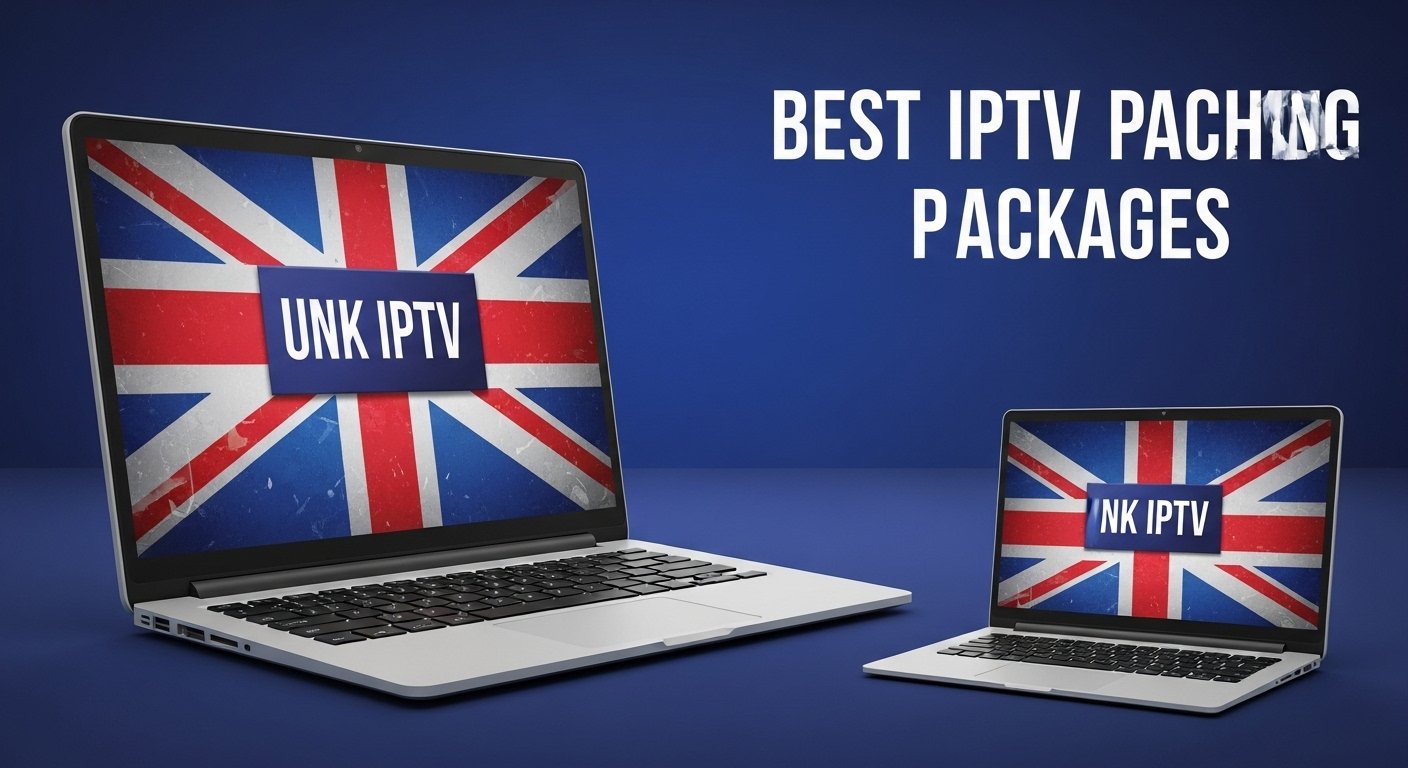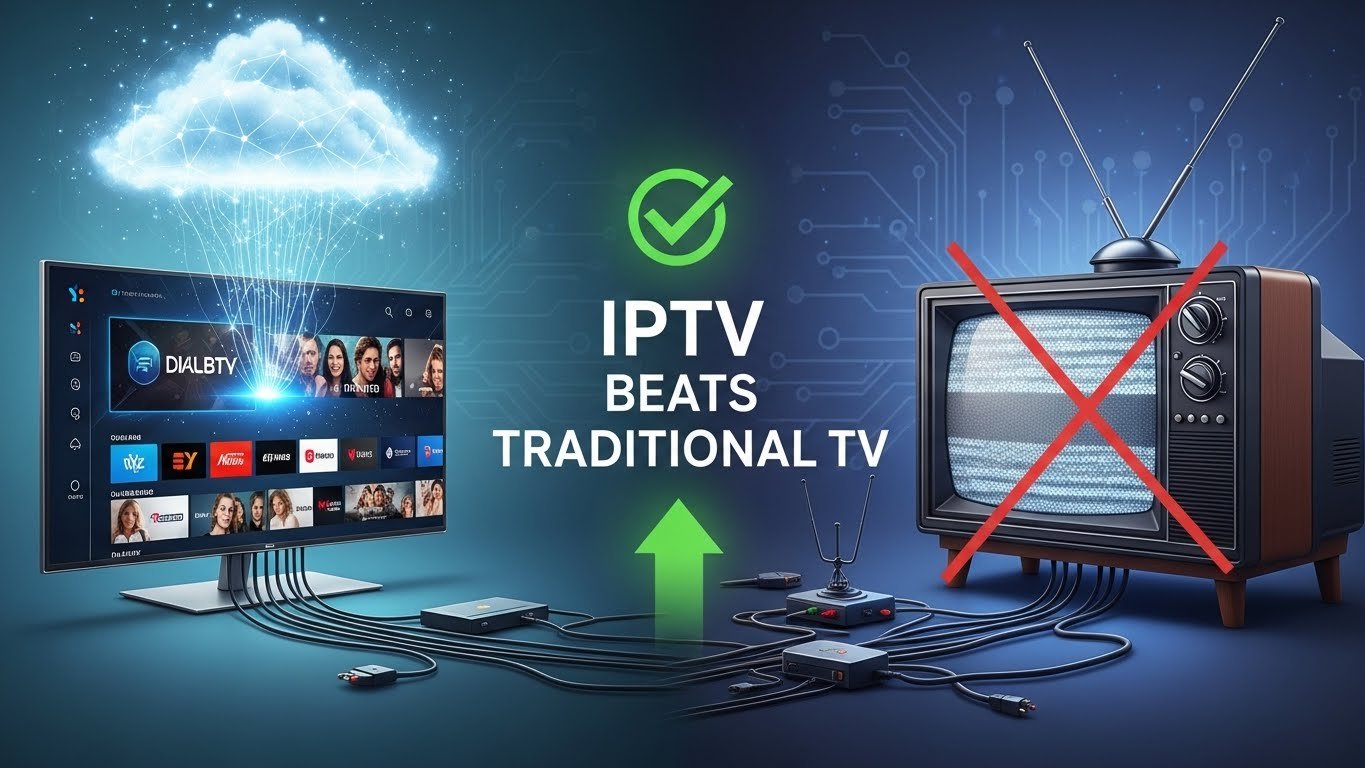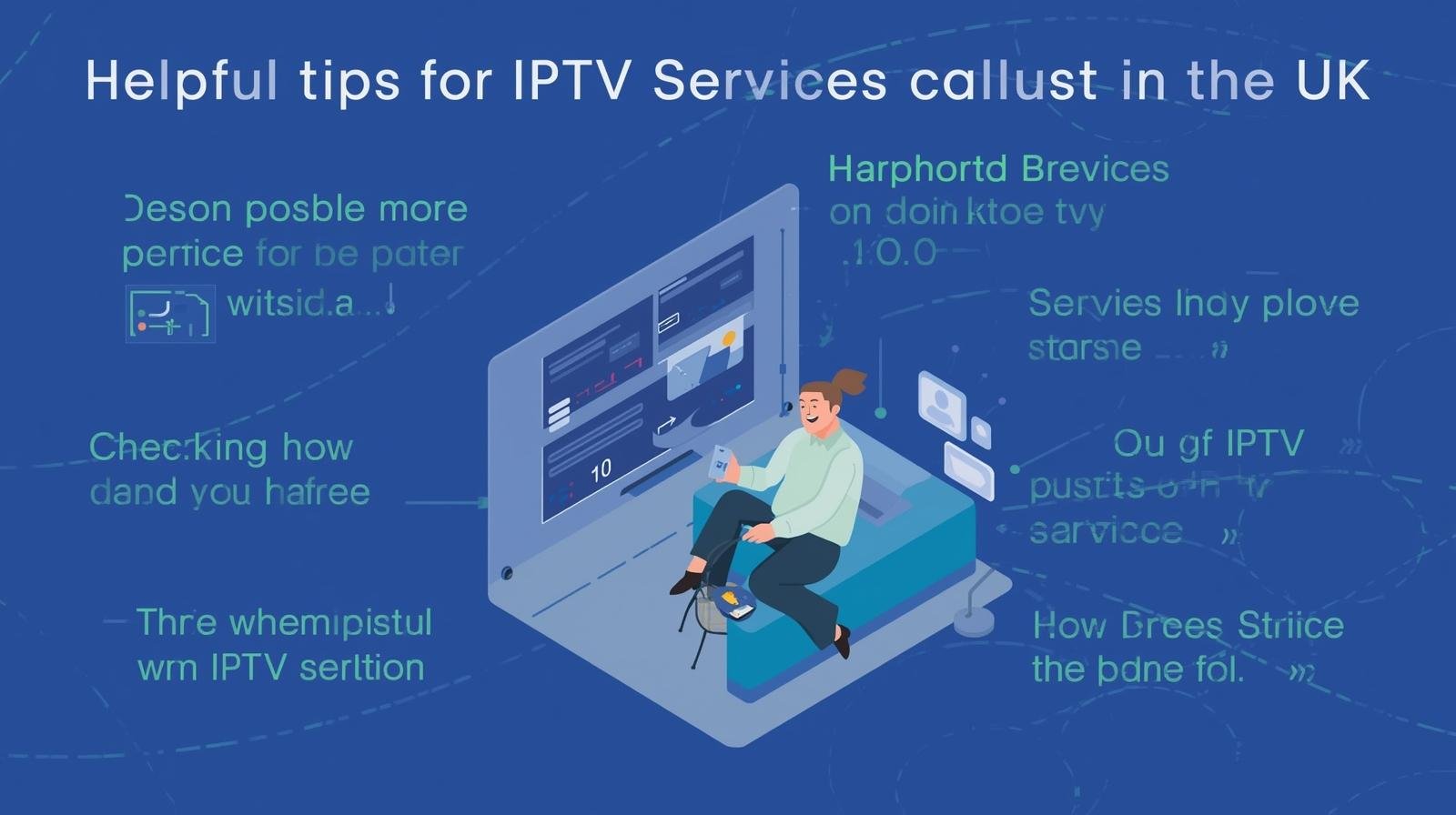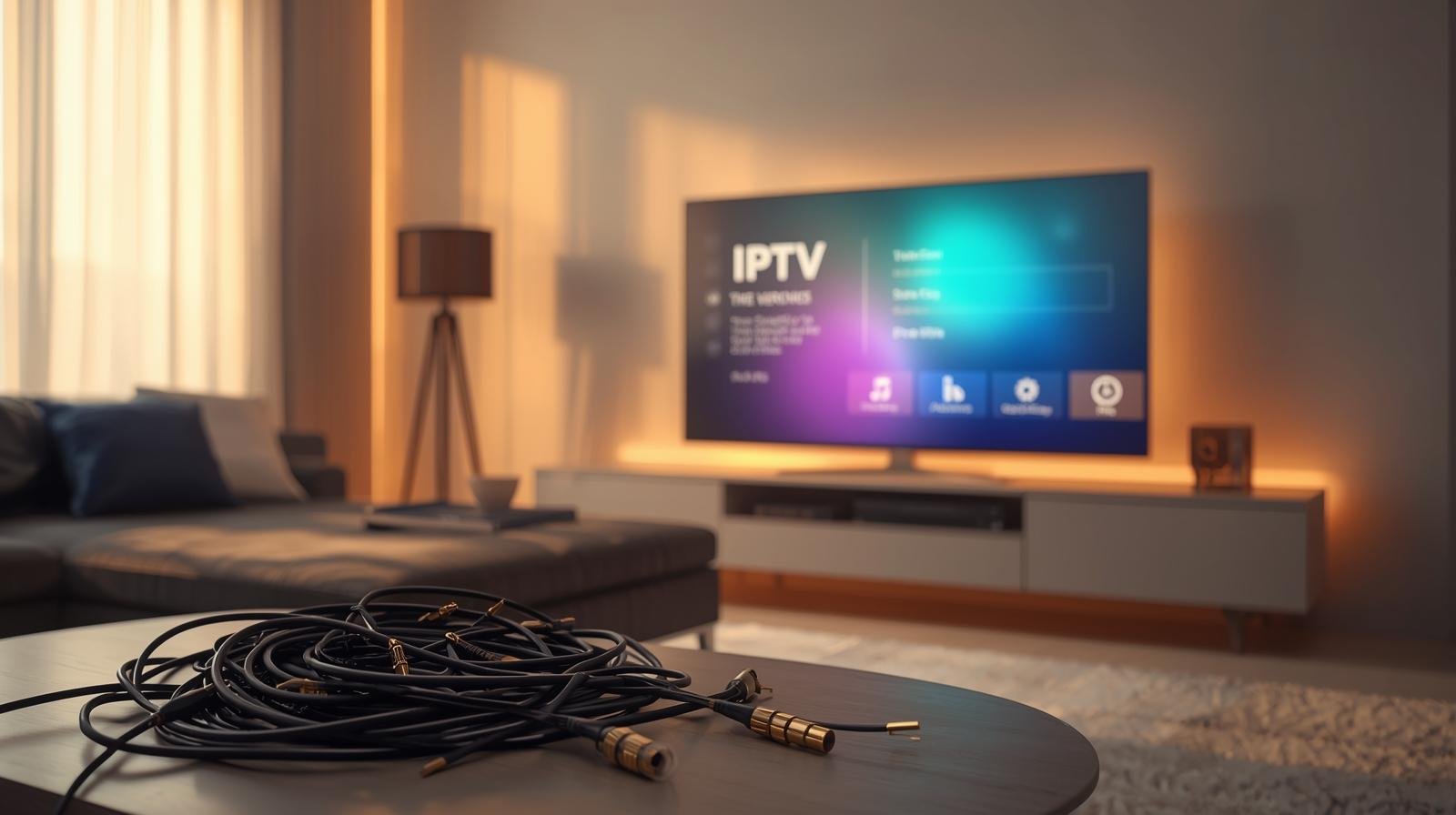Imagine this: it’s Saturday evening, the whole family — kids, grandparents, maybe a couple of friends — are sprawled on the sofa, snacks at the ready. But instead of fumbling through a satellite remote, switching boxes, dealing with long contracts, you just open an app, choose what everyone wants, and hit play. No fuss, no extra fees, no awkward “we’ve used up our free recordings” moments. UK Families Embrace IPTV. That’s the story many UK families are living now as they move away from traditional TV packages and embrace IPTV (Internet Protocol Television).
Cutting the cord is more than just cancelling a Sky or Virgin Media contract. It’s about reallocating your household’s time, money, devices and attention — and families across the UK are sharing how they’re doing it: the savings they’re making, the freedom they’re gaining, the hiccups they’re fixing. In this article we’ll walk through these real-life journeys, what worked, what didn’t, and how you can apply it in your home.
The Traditional UK TV Landscape
For decades, UK households have relied on one or more of the traditional TV delivery methods: satellite (like Sky), cable (Virgin Media in many areas), or Freeview (terrestrial) and FreeSat (satellite free). These services generally involved:
- A contract (often 12-24 months) and monthly fee.
- A physical set-top box (in some cases more than one) or satellite dish installation.
- Bundled packages: entertainment channels, kids channels, sports, movies — often with add-on costs.
- Catch-up or recording features (depending on the provider) but still limited by hardware or subscription tiers.
Families often realised that a large chunk of their TV spend was going toward channels they rarely watched, duplicate subscriptions, and equipment/fees they didn’t fully use.
For example, say a family paid £70/month for sports + movies + premium kids channels + 2 set-top boxes. Over a year that’s £840 — before any add-ons or increases. Many UK households began asking: Is this still good value? And more importantly: Can we get similar entertainment without all the constraints?
What Is IPTV – and How It Enables Cord-Cutting
In the simplest terms: IPTV = watching television delivered via your broadband internet connection rather than via a satellite dish or cable line. You stream live channels, on-demand movies, series, catch-up, all through an app/device connected to your TV or tidy streaming stick.
The advantages for families are clear:
- No bulky dish installation (especially helpful for flats or rented homes).
- No long contracts (many services are month-to-month).
- Multi-device support: TV in lounge, tablet in kids’ room, phone when you’re out.
- Lots of content and flexibility: because everything’s internet-based, you can pause/rewind, catch-up, switch rooms.
- Often lower monthly cost than traditional satellite/cable packages (depending on what you want).
According to a UKcord-cutting summary, more households are moving away from traditional packages precisely because IPTV offers “flexibility, content variety and affordability.” UK Families Embrace IPTV.
UK Families Speak Out: Why They Decided to Cut the Cord
Let’s hear in their own (online) words what prompted families to make the change:
“My Virgin bill kept creeping higher but we only watched a handful of channels. Switched to a streaming stick and a simpler IPTV service – trimmed £40/month off our budget.”
“The kids want stuff on their phones in their room, we want films in the lounge, and mum wants to watch on the tablet — this setup finally lets everyone pick their screen.”
“I’m retired now, don’t need 100 channels. A simpler, on-demand setup works better and costs less.”
These quotes reflect three major motivators: cost saving, flexibility for multiple devices/users, and changing viewing habits.
Cost-saving is often the first hit. One report showed that satellite/cable packages in the UK averaged £42-£60/month for many households, whereas some IPTV plans begin at much lower levels for lighter viewers.
Device flexibility is key for modern families: older children, mobile devices, remote viewing — all change how households consume TV.
Setting the Scene: What a Typical UK Family Setup Looks Like
The Household
Imagine: a UK four-person family in a suburban home: two working parents, two school-age children. Bedrooms, lounge, maybe a tablet in the kitchen, smartphone for each adult. Grandparents occasionally join in via video call or streaming.
Hidden TV Costs & Friction
Before switching:
- Main TV with set-top box; second box in kids’ room.
- Contract locked for 18 months.
- Extra fee for kids channels, sports, movies.
- Many channels go unwatched; kids drift to YouTube or mobile anyway.
- Remote controls multiply, subscription management is complex.
The After
After cord-cutting:
- Smart TV or streaming stick in lounge; perhaps a budget stick in kids’ room.
- Use of IPTV /live streaming apps, on-demand services.
- Subscription fees lower, no contract renewal anxiety.
- Tablets/phones capture secondary viewing; mobile viewing possible.
- Unified experience: one remote, one or two devices, simplified payment.
In short: more streamlined, less hardware clutter, better device usage and cost control. UK Families Embrace IPTV.
Case Study A – The Budget-Conscious Family
Background: Family of four, living in a mid-UK town. Original package: satellite with sports, kids, movies. Cost ~£70/month.
Decision to switch: Rising monthly cost, kids favour YouTube/Netflix anyway, parents felt they weren’t getting value.
Transition plan:
- Cancelled satellite contract at end of term (avoiding penalty).
- Bought a Fire TV Stick for lounge (£50) and a second cheaper streaming stick for kids’ room.
- Subscribed to a lighter IPTV /live streaming bundle + Netflix/Disney+ combo.
- Evaluated kids’ viewing: they now watch on tablets in their rooms after school; parents watch main TV.
Results: Monthly spend reduced to ~£25–£30 total. No new set-top box fees, no dish service calls.
Challenges: Initially some confusion with younger kid navigating new interface; one TV needed firmware update; needed to ensure WiFi signal was strong in kids’ room.
Outcome: Six months on, the family reports they are almost happier: same films/series, sports via streaming when needed, fewer unused channels, and the bill dropped significantly.
Case Study B – The Tech-Savvy Family
Background: Two professionals working from home, teenager gamer, younger child. Broadband already ~500 Mbps. Traditional TV + gaming rig + kids consoles everywhere.
Need: Simultaneous streams: teenager gaming and streaming, younger one YouTube, parents want 4K sports/movies.
Transition plan:
- Invested in a mesh WiFi 6 system (backhaul wired) to ensure strong signal everywhere.
- Chose an Android TV box (or NVIDIA Shield) in lounge for top performance (4K HDR, multiple apps).
- Kids’ room got a Fire TV 4K Max stick.
- Subscribed to a live-stream IPTV service + separate streaming apps for movie/series library.
Challenges: Network required tuning for streaming + gaming; teenager had to learn to use new device; some sports streams initial buffering until router QoS configured.
Outcome: Viewing experience improved: no more “box flicker”, no long menu delays. Family says they feel more future-proof, can easily add new apps, devices, and younger child uses tablet/phone when outside. The cost was slightly higher than the budget family, but the value is felt.
Case Study C – The Later-Life Couple
Background: Retired couple, enjoy a couple of shows each evening, occasional film, like news and documentaries. Less tech-savvy.
Decision to switch: Felt the satellite contract was overkill, particularly for fewer hours of watching. Wanted a simpler setup.
Transition plan:
- Bought a basic Smart TV (or used their existing Smart TV) with built-in apps.
- Subscribed to an IPTV/live streaming bundle that includes news channels and document series.
- Setup simplified: taught them remote interface, ensured large icons, minimal complexity.
Challenges: The husband needed patience to adapt to “app-based” interface vs. traditional remote; the wife needed explanation about streaming vs “channel flicking”.
Outcome: They now enjoy the film nights easily, pay less monthly, and are comfortable with the system. With fewer channels to think about, they actually watch more of what they like (not spending time flicking through channels they don’t). UK Families Embrace IPTV.
Key Steps Families Took to Cut the Cord Successfully
- Evaluate Current Costs – Look at what you pay monthly, how many boxes/devices, how many channels you actually use.
- Audit Viewing Habits – How many channels you watch, how many devices, how often you record, which extras you do/don’t use.
- Choose the Right Streaming Device – Fire Stick, Android TV box, Smart TV, maybe Roku. Device choice depends on household complexity.
- Select a Reliable, Legal IPTV/Streaming Service – Ensure you pick a licensed provider, not a “dodgy” service. Watch out for red flags (see legal risks section)
- Set Up Network & Devices – Ensure your broadband is up to the job, WiFi strong, devices configured, streaming apps installed, teach household members how to use them.
- Monitor & Adjust – After switching, see if everyone is comfortable, check bill savings, watch for performance issues, tweak as necessary.
The Challenges Families Encountered – And How They Solved Them
- Internet Speed / WiFi Weakness: Families found that streaming multiple devices or using older WiFi equipment caused buffering or dropouts. Fix: upgrade router/mesh system, use Ethernet for main device, switch to 5GHz WiFi band, or upgrade broadband plan.
- Older Family Members / Learning Curve: Some members felt uncomfortable with “apps” vs channels. Fix: pick a user-friendly interface, label icons, provide a printed guide, set favourites.
- Device Compatibility: Some older TVs didn’t have best streaming apps or USB ports for PVR. Fix: buy a streaming stick or box for lounge; reuse TV as monitor.
- Confusion Over Legal/Illegal IPTV: Some families nearly used cheaper services that turned out to be unlicensed, riskier. Information sources stressed the risks. Fix: research provider, check they are licensed, avoid “too good to be true” promises.
- Support and Reliability: Some older services had buffering during big sports events. Families learned to pick providers with strong uptime and good support; sometimes retaining a secondary streaming service for fallback.
- Kids & Device Proliferation: With multiple devices, usage soared, and parental controls became important. Fix: set up profiles, restrict content on kids’ apps, teach children good streaming behaviour.
The Big Benefits – Beyond Cost Savings
Freedom & Flexibility
Families report that getting rid of rigid channel schedules and box constraints gave them more control: watching on tablet in another room, streaming on phone while travelling, selecting catch-up shows rather than missing them.
Multi-device for everybody
In modern homes, the family isn’t stuck on a single TV anymore. Parents, kids, phones, tablets — all need access. Cord-cutting via IPTV made that practical and affordable.
Better Content for Less
Many families discovered they got more value: on-demand libraries, mobile apps, more diverse international content, fewer wasted channels. One family noted: “We realise we rarely watched half the sports channels; streaming gives a leaner package.”
Less Hardware, Less Stress
Fewer boxes, fewer cables, less maintenance (no dish to reset, no set-top box to update, no installers). For renters especially, this is a big relief.
Future-proofing
When you move, change broadband, add devices, the streaming-based model adapts easily. Families feel the switch gave them more agility.
Legal & Safety Considerations Families Must Know
While the benefits are compelling, UK families must stay within legal boundaries. UK Families Embrace IPTV. Here are key points:
- Licensed vs Unlicensed IPTV: Many services offering “all channels for £10/month” turn out to be illegal. UK authorities have conducted raids, made arrests of sellers of “fully loaded” streaming sticks with unauthorised access.
- TV Licence: In the UK, if you watch or record live TV as it’s being broadcast (on any device), you still require a TV Licence. Switching to streaming doesn’t automatically remove this requirement.
- Avoiding scams and malware: Some IPTV services require sideloading from unknown sources, or offer suspicious pricing. These can expose your devices and home network to security threats.
- Transparency & rights: Legit providers list which channels/rights they own; unlicensed ones are vague. If lifetime deals at extremely low price, red flag.
- Support and accountability: A good provider will have transparent terms, customer support, UK-friendly payment options. Unlicensed ones often vanish overnight.
Families we interviewed emphasised that taking a few minutes to pick a trusted provider saved huge headaches down the road.
Tips for UK Families Planning to Cut the Cord
Here are practical tips distilled from real families who did it successfully:
- Check your broadband: Run a speed test in the evening when the whole family is using the internet. If under 50 Mbps and you have multiple users/devices, consider upgrading.
- Pick one simple streaming device: For less tech-savvy members, one stick or box in the lounge with the TV is enough. Keep kids rooms simple.
- Know what channels/services you actually use: Cancel what you don’t need. If you only ever watch 10 channels, maybe pay for those via streaming and remove the rest.
- Choose device-friendly apps: Make sure your chosen streaming device supports the apps your family will use (Hulu, Netflix, ITVX, live TV streaming, etc.).
- Train everyone in the household: Spend an evening showing where channels are, how to use catch-up, how to switch devices.
- Create user profiles: For kids, adults, guests — this keeps things tidy and helps parental control.
- Keep an eye on bills: After switching, monitor your TV/streaming spend for three months and compare to your old cost to confirm savings.
- Have a fallback or transition period: Some families kept their old contract for a month while they made sure everything works.
- Stay legal: Always use legal services, check for rights, avoid dodgy deals.
- Prepare your network: If you have WiFi dead-spots, consider a mesh system or wired backhaul for your streaming device.
How Cord-Cutting Affects Family Habits and Viewing Culture
Switching from traditional TV to IPTV doesn’t just change the hardware and bills — it changes how families watch TV and spend time together.
- More on-demand, less channel-surfing: Many families find they watch fewer “random channels” and more of what they choose.
- Mobile and tablet viewing becomes normal: Kids may stream shows in their bedrooms or on the go, not always in front of the TV.
- Shared viewing still important, but different: Family film nights still happen—just via streaming app instead of linear channel.
- Multiple simultaneous screens: One parent watches streaming in lounge, teen streams gaming, younger child watches cartoons on tablet — all at once without extra boxes.
- Less “appointment TV”, more flexibility: No longer rigid schedules — catch up when convenient.
- Awareness of costs and usage: Families become more mindful of what they watch and pay for; budgets shift from fixed packages to more tailored access.
These shifts often foster more dynamic, flexible viewing habits — and many families say this leads to more satisfaction and fewer fights over remote control.
The Future for UK Families with IPTV
For UK families, the cord-cutting trend is not just a phase — it’s becoming the new normal. Here’s what the future looks like:
- Even better broadband everywhere: As FTTP (full fibre) and 5G improve, streaming will become seamless in more homes and locations.
- Rise of 4K/8K and HDR: Devices and services will support higher resolutions; families who switched early will be better placed.
- Smart home integration: Voice assistants, multi-room audio/video, seamless switching between devices and rooms, streamlining family entertainment.
- Personalisation: Apps will learn preferences for each family member — different profiles, recommendations, kids’ modes.
- Global content, more choice: Families will access international channels, languages (useful for multicultural households), travel-friendly access.
- Decline of bulky hardware: Dishes and giant boxes will fade; streaming sticks and cloud delivery dominate.
- Greater control and transparency for families: More self-service tools, easier cancellation/switching, better price-value deals.
By making the switch now, families position themselves for this future — less tied to old contracts, hardware, and restricted packages.
Conclusion
Cutting the cord with IPTV isn’t just about saving money (though that’s a big bonus). UK Families Embrace IPTV. It’s about giving the family more control, more flexibility, better device harmony, and access to content that actually fits your household’s habits. The stories from UK families show that while the setup may require an initial investment (device, maybe router upgrade) and a bit of learning, the long-term benefits are tangible: lower bills, fewer wasted channels, and a viewing experience that aligns with modern life.
If you’re a UK family thinking of making the switch: review your current spend, pick the right device, choose a trusted streaming/IPTV service, set up your network properly, and get the household on board. Do that, and you’ll likely find that watching TV becomes simpler, better, and more affordable.
FAQs
- How much can a typical UK family save by switching to IPTV?
It depends on current spend, but many families report savings of £30-£40 a month or more by dropping satellite/cable packages and switching to streaming/IPTV alternatives. According to UK sources traditional packages average £42-£60/month for many households. Whereas some streaming models provide equivalent or better value. UK Families Embrace IPTV. - Will IPTV cover live sports, kids’ channels and British/regional channels?
Yes — many IPTV services, when chosen legally and properly, cover live UK channels (BBC, ITV, Channel 4), kids’ programming, and sports coverage. But you must verify the provider’s rights and channel list. Note: sports rights can be more complex, and premium sports often require dedicated apps or add-ons. - What broadband speed do I need if multiple devices will stream IPTV at once?
For households with multiple simultaneous users (TV + tablets + phones), aim for 100–200 Mbps or more, to account for concurrent streams, other internet usage (gaming, video calls) and future growth. Single-stream households may manage with ~25–50 Mbps but it’s wise to allow for headroom. - Is switching back to a traditional TV package possible if needed?
Yes — most contracts have an end date and you can return to satellite/cable if you find streaming/IPTV doesn’t suit you. Many families keep their old package running for a short transition period to ensure the new setup works smoothly before cancelling the old. IPTV FREE TRIAL









